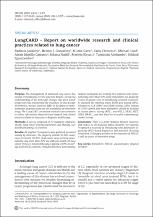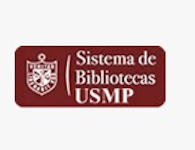LungCARD – Report on worldwide research and clinical practices related to lung cancer

Ver/
Trabajo
(application/pdf: 1.622Mb)
(application/pdf: 1.622Mb)
Fecha
2019Autor(es)
Jankovic, Radmila
Goncalves, Helena J.
Cavic, Milena
Clemente, Carla
Lind, Michael
Murillo Carrasco, Alexis
Nadifi, Selama
Khyatti, Meriem
Adebambo, Tumininu
Egamberdiev, Dilshod
Metadatos
Mostrar el registro completo del ítemResumen
Purpose: The management of advanced lung cancer has evolved tremendously over the past two decades. Increasing understanding of the molecular changes that drive tumor progression has transformed the treatment of this disease. Nevertheless, various countries differ in the degree of implementation of genetic tests and the availability of innovative drugs. The LungCARD consortium created a questionnaire to collect information about the local research and clinical practices related to lung cancer diagnosis and therapy.
Methods: A survey composed of 37 questions related to specific lung cancer pharmacogenomics and therapy, was distributed among 18 countries.
Results: All together 36 responses were gathered, answered mainly by clinicians. The majority attends 50-200 cancer cases per month, 20-50% of all cancer cases are lung cancer patients, and more than 80% are with non-small-cell lung cancer (NSCLC). Targeted therapy is applied to 50% on average of all NSCLC patients. Forty five percent of participating medical oncologists are treating their patients with immunotherapy. More than 90% of the respondents are guided by results of genetic tests in introducing targeted treatment. As expected, the majority orders EGFR gene testing (85%), followed by ALK (58%) and KRAS testing (32%). Almost all (96%) agreed that more biomarkers should be included in routine genetic testing (ROS1, anti-PDL1, KRAS, MET, HER2, BRAF...), and that blood test is useful in pharmacogenomic testing.
Conclusion: There is a great variation between countries with respect to all discussed topics. However, the majority recognized a necessity of introducing next generation sequencing (NGS)-based diagnostics and potential of testing from blood. The biggest problem in the treatment of NSCLC is still an access to innovative drugs.
Colecciones
- Artículos [274]
Materias
Editor
BAKIS Productions LTD
Acceso
info:eu-repo/semantics/openAccess
Financiamiento
European Union’s Horizon 2020 research and innovation programme under grant agreement No 734790 Project Number: 734790







